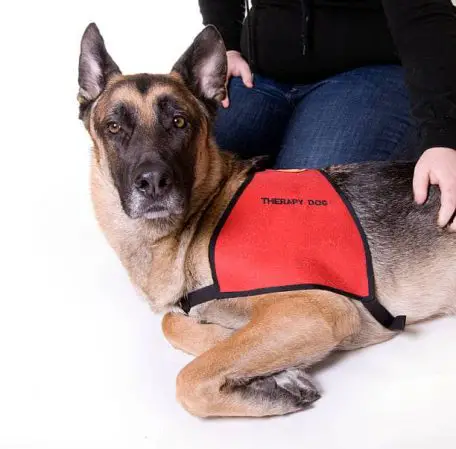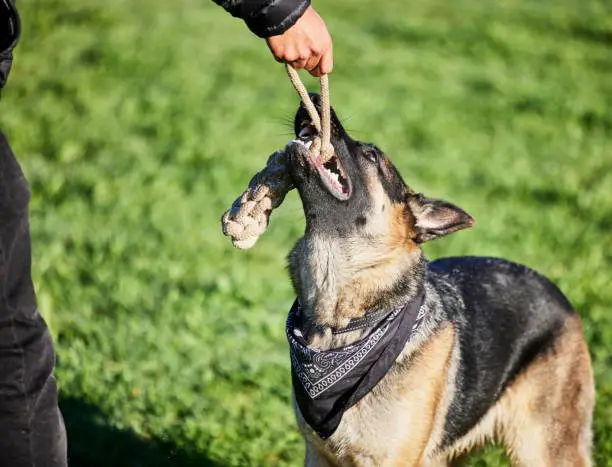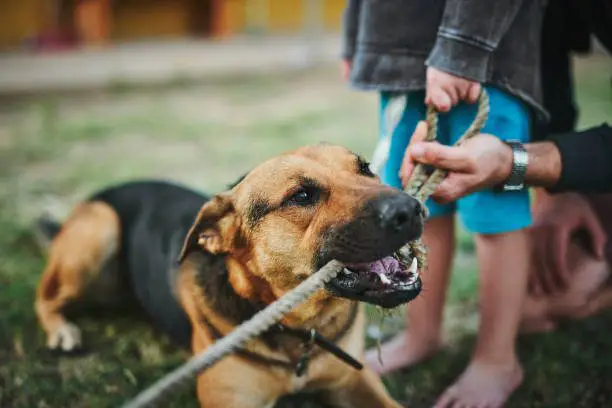German Shepherd Behavior Problems and Ways To stop It
What are German Shepherd behavior problems?
A German Shepherd is a dog that everyone loves. These happy-go-lucky puppies have big personalities and make great friends because they just want to be with you.
The German Shepherd just wants to be with you and follows your lead, whether you’re sitting on the couch watching Netflix or running to the dog park.
Why, then, do some German Shepherds have a bad name? Well, for one thing, German Shepherds are very attached to their people and like to follow them around.
That’s another reason why we love them so much. They are very faithful!
But when you’re not at home, it’s hard for a German Shepherd to get by on its own, especially for such a long time.
If you work from 9 to 5, these rascals won’t be able to wait for you all day. They will either go crazy or become sad.
So, if you want to get a German Shepherd, you should learn about German Shepherd behavior problems and what makes them happy.
If you already have one of these tail-wagging, big-eyed fools, these insights into how your German Shepherd thinks will be very helpful.
Do German Shepherds get along well with kids and other pets?

German Shepherd behavior problems with other dogs and kids;
The German Shepherd is one of the best dogs you can bring home to your kids if you have a family. They make great friends and love to play with kids.
Also, they are stronger than smaller dogs like Carolina dog, which makes them better for kids who like to play rough.
German Shepherds are also known for being friendly and getting along well with other dogs.
But they are very competitive, and male German Shepherds often attack other male dogs.
But it’s safe to introduce your bully to other pets one-on-one, since they don’t really like getting into fights.
They are funny but Gassy
It’s true that German Shepherds have a lot of strange habits, like snorting and getting really gassy out of nowhere.
This problem is caused by the shape of their faces.
Since these breeds tend to swallow a lot of air when they eat, it usually comes out the other end.
Help with this problem can come from eating real meat and vegetables.
German Shepherd Separation anxiety
We’ve already talked about this, and most dog owners know that dogs don’t like it when you have to leave.
However, German Shepherds are especially likely to have severe separation anxiety.
When left alone for hours, they may destroy the house, whine for hours, or urinate everywhere to show how unhappy they are.
Most of the time, this kind of anxiety happens when you leave the house and don’t come back for hours.
German Shepherds worry that you might never come back, so they will go to great lengths to find you again, even if they hurt themselves in the process.
German Shepherd behavior problems
Here are some German Shepherd behavior problems;
- While you’re gone, they’ll bark and howl.
- Dig, chew, and break everything in the area.
- Try to escape.
- Walk and talk
- Pee and poop all over the house.
Experts on German Shepherds say that you should use “counterconditioning” to stop this behavior.
This means giving your Shepherd a treat or something fun to do while you’re gone. You can buy puzzle-like toys that have treats hidden inside.
If you work long hours, you might want to use a service like Rover.com to come check on your pet while you’re away.
Even though they are cute, you can’t leave them alone for more than an hour.
How Hard Is It to Train a German Shepherd?
Are German Shepherds difficult to train?
German Shepherds can be stubborn and not pay attention when they don’t understand what the game is about. That’s one of the German Shepherd behavior problems.
If you are housebreaking a new puppy, they may need extra steps and help to learn where to go when they need to go.
YourPureBredPuppy says that some people suggest crate training in the beginning, but there are other ways to housebreak a puppy that don’t involve putting your German Shepherd in a crate.
Slobbery Problems
Even though this isn’t a problem for all German Shepherds, there are some with loose lips and shorter faces that can’t help but spray and drool when they drink.
You might need to slightly raise your dog’s water bowls to help it.
Clingy Problems
German Shepherds usually follow their owners around. When you’re at home, they don’t want you to leave their sight.
Did you know that German Shepherds are raised to be loyal to their owners?
This is what AspcaPetInsurance says. This is the main reason why their two biggest problems—fear of being alone and being too attached—happen.
If your German Shepherd has Velcro dog syndrome, it may have bothered you while you were eating, sleeping, going to the bathroom, or going to the problem,
or it may have even been mean to other people or animals in the area. They might also whine a lot.
To stop your German Shepherd from being too clingy, you’ll need to give him or her some confidence.
You can give your dog a bed of their own, and make it more appealing by putting something of yours, like a t-shirt, and some toys in it.
You can also make yourself boring to them, which basically means don’t give them too much attention.
It’s hard to turn down that face! One thing to think about is that German Shepherds can also be trained well.
You can train your German Shepherd to stay away from you if you can teach it to sit, stay, and do other things.
Barking German Shepherds
Why do German Shepherds make so much noise?
Most German Shepherds don’t bark as much as they whine, but they do make some funny noises. That’s another German Shepherd behavior problems.
You shouldn’t worry about any of these noises unless they keep getting louder and more frequent.
Your German Shepherd may also be sounding an alarm or behaving in a stressed way because of pain or worry.
If this is a new behavior, you might want to talk to a vet about it to see if there are any hidden problems.
Destructive Chewing and Scratching
German Shepherds do dig and chew a lot. This is a pretty normal thing for a dog to do, especially when it’s a big bone.
But if you’ve left your German Shepherd alone for too long and they get into your trash bin and tear up paper and old food, you’ve probably also seen their “sorry face.”
German Shepherds usually chew to calm down and get rid of stress and anxiety. It could also be because it’s hungry or bored.
If you notice that your German Shepherd does this when left alone, you should find puzzle toys with treats inside to keep them busy while you’re gone.
You should also take them on long walks or take them to the dog park every day so they can run off some steam.
If not, they will take it out on anyone or anything they can find.
The Biting German Shepherd
Most German Shepherds are close to their owners, and sometimes that can make them act too territorial in ways that are bad for them.
Most of the time, this leads to growling, but it could also lead to biting or other aggressive actions.
When a German Shepherd puppy is young, it’s important to teach it that biting hurts.
When their owners pull their hand away after being bitten, many pets think they are playing a game of chase.
In reality, when you get a small bite or scratch, you should act as dramatic as possible.
This shows your dog that people are fragile and they need to be careful around you.
The best way to train your German Shepherd puppy to be a nice and happy dog is to use positive reinforcement and start socializing it as soon as possible.
The place where your puppy came from is also important.
Some kids learn bad habits early on from parents who spoil them and may be mean to begin with.
If you can, you should get to know the parents and make sure they are nice and friendly.
Tips for raising a well-behaved German Shepherd
Chewy says that most German Shepherds have even temperaments and are just happy to be around you.
They’ll listen to anything you say, even if you tell them they’re doing something wrong.
Even though they don’t bite or act aggressively often, this could change if they are treated badly and don’t get enough attention or things to do.
Here are some things you can do to help your puppy with behavior problems.
Do the training classes
Even if you have a German Shepherd that is a few years old or more, training can help you bond with it and reward it for being good.
These classes also help with obedience training and help you and your dog get along well.
Since German Shepherds are so smart, it’s more important to get them to pay attention to you and do what you want than to show off in front of other dogs.
Think about how your German Shepherd feels.
The worst thing is to feel like no one gets you or cares about you.
The bond between a German Shepherd and its owner is very strong. If they are ignored or shunned, they may get angry or act badly.
A German Shepherd is friendly, funny, and always up to something, so all they want to do is make you smile.
The best way to show love and understanding is through positive reinforcement, petting, talking, and going for long walks.
Early Socialization
When they are young, German Shepherds learn a lot from being around other dogs, kids, and people.
They should know everything there is to know about their surroundings, so that nothing surprises or scares them, like a bigger dog or a big bus pulling up outside.
They need to get used to their world when they are young, and they are usually more active when they are puppies.
They should start going to the dog park often as early as six months.
Shepherds tend to slow down between the ages of 7 and 10, but the best way to make them live longer is to keep them busy and social.
Learn About Your German Shepherd’s Personality
Also learn about German Shepherd behavior problems.
Find out what kind of dog your German Shepherd is.
German Shepherds are so cute and fun to spend time with. They like to hang out with you and have big hearts.
They need to feel like they’re part of the family, and as puppies, they’re just all over the place.
They will snore, be nosy, and act wild, but as they get older, they tend to slow down.
Shepherds who are loved a lot can sometimes become stubborn.
This shows up as wanting more attention and getting angry when other people take the spotlight.
This is why it’s important to spend time with other people and animals.
Can adult German Shepherds be trained?
German Shepherds are usually very observant and can learn at any age.
If you decide to take your bully to training classes, you might want to choose a smaller class for an older German Shepherd so that they can focus on the task at hand and work one-on-one with you.
Dogs usually have a good attitude, but each one also has its own story and personality.
The best way to keep your German Shepherd in line is to train it well.
If you’ve recently seen your German shepherd acting weird, you might want to watch some videos to see how other owners deal with their dogs’ high energy as puppies and their stubbornness as they get older.
Here’s a good place to start:
Are you ready to help your German Shepherd?
German Shepherds like to act like you, so that’s something to keep in mind.
Your dog could pick up on your stress, anxiety, or anger at home because they are very observant and responsive to your needs.
If you see them being aggressive when you are around, you may want to talk to them in a calm, positive way, bring them close to you, and act as if you are not worried.
That’s how to take care of German Shepherd behavior problems.









